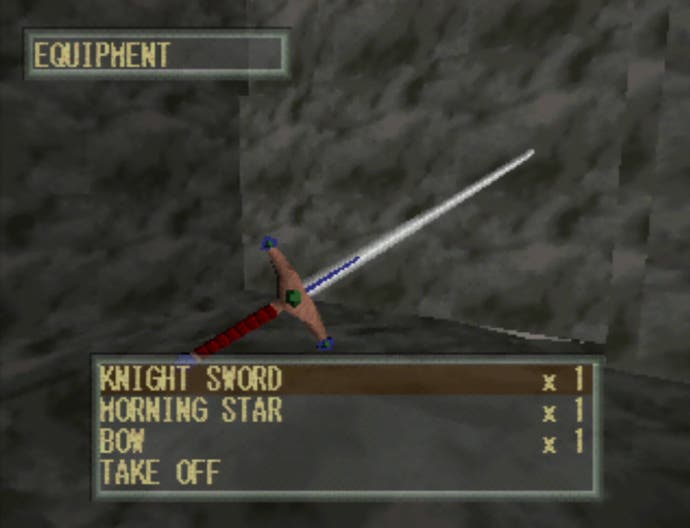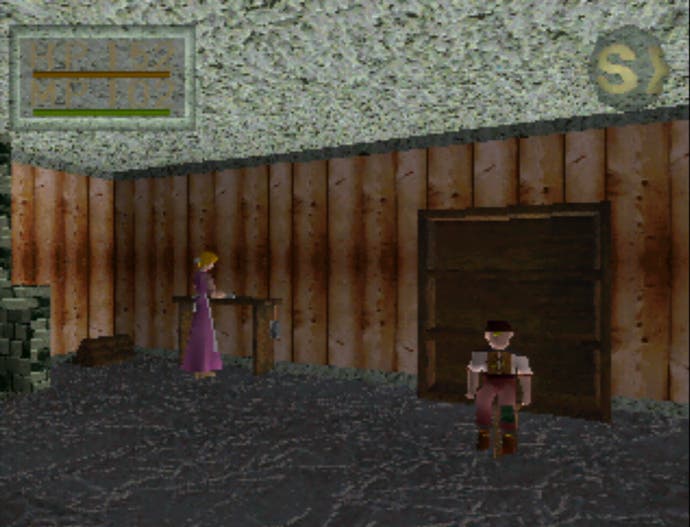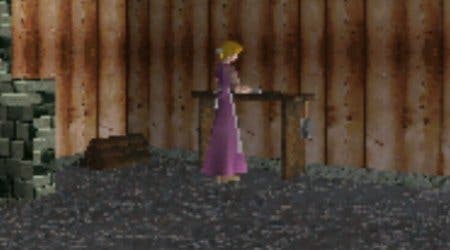Retrospective: King's Field
Where Souls were born.
Dark Souls is considered From Software's spiritual successor to Demon's Souls. And Demon's Souls was deemed the spiritual successor to the King's Field series, which made its debut in the mid-1990s on the PlayStation. We toss around this term "spiritual successor" a lot, mostly when we want to say "sequel" but it doesn't quite fit. A spiritual successor is more interesting, anyway. A sequel is a marketing strategy; a spirit can be profound.
The action RPGs in the King's Field/Souls lineage share a number of aesthetic qualities, like quietness, a grim visual feel, and ruthless difficulty. There's a more fundamental thread that runs through them, though - a deep respect for the player. Call it dignity.
Shortly after the release of Dark Souls this year, I decided to revisit King's Field, which is the first PlayStation game I ever played. Returning, in 2011, to one of the earliest PS1 games is something of a shock, because 16 years of refinement and evolution in game production are suddenly gone. But the dignity is there.
(A clarification before I go on: The game I'm talking about in this article was released as "King's Field II" in Japan. When they released the game in North America and Europe, they called it simply "King's Field." Yes, it's confusing. Japanese RPG publishers of the 1990s loved to pull this kind of crap. As for the original Japanese game by the name of "King's Field," to my knowledge it was never localised for English-speaking audiences, and I haven't played it in any language.)
When King's Field begins, you're on the outskirts of an island, wearing nothing but a dagger. Luckily, this game takes place in the first-person perspective, so you can't see your unmentionables flapping in the cold ocean breeze. You don't know what your "mission" is, but given that you're weak and naked, it seems prudent to do something about that. So you begin exploring, and you never stop.

The island where the action takes place is called Melanat, and it's safe to assume that no urban planner has ever set foot here. The interior of Melanat is a contorted network of caverns, enemy military bases, abandoned castles, and the occasional village. You can roam freely, but you'll want to roam carefully. You'll frequently turn a corner in what seems to be safe terrain, only to run into a brutal foe. In an instant, what was a leisurely stroll turns into a fearsome fight-or-flight moment.
"We toss around this term 'spiritual successor' a lot, mostly when we want to say 'sequel' but it doesn't quite fit. A spiritual successor is more interesting, anyway. A sequel is a marketing strategy; a spirit can be profound."
The story eventually fills in, as does your knowledge of the island. King's Field is more concerned with the latter. Yes, with time it becomes clear that you must banish evil and retrieve a magical sword and so on, but that stuff is just wallpaper (although there are some appealingly dark subplots). The game is really about conquering the island by learning it, piece by piece, until you know the whole thing. The prime directive is always to look for a place you haven't been before, go there, and see if you survive.
Often, you won't survive. Players of the Souls games are familiar with From Software's insistence that frequent death builds character, and they've been following that philosophy since the beginning. The monsters you encounter 30 seconds into the game - bulbous grey spider-squid hybrids - will kill you.
After you revive, the natural inclination is to go in another direction. But the designers have predicted which path you're likely to take on your second try. There, in the middle of your Plan B, they have placed a spider-squid creature who's 10 times the size of the other ones. The realisation dawns: those freaks of nature that mowed you down the first time around? They were the babies.
This is a homely game, even for its time, which is saying something. We look kindly on the chunkiness of the early arcade era because video games were in their infancy then, and likewise the graphics of the 8-bit/16-bit years have a childlike simplicity in retrospect. But the first wave of PS1 games were video games' awkward stage, the dawn of 3D puberty. Everything was out of proportion, the games were uncomfortable in their three-dimensional bodies, and pimples? Brother, it was nothing BUT pimples.
And so it is with King's Field. The world is built from huge, low-res slabs of brown and grey, a far cry from the ultra-detailed brown and grey of today's games. Graphical slowdown is practically constant, as the game's visual engine was not designed to accommodate more than one thing being on screen at once. (I played on a PS3 for this retrospective, but the molasses effect isn't an emulation thing - it runs the same way on the original console. And by the way, if you do play this game on a PS3, turn on smoothing. It makes a big difference.) The audio end of things is no better, generally avoiding anything that might resemble a catchy melody.
That said, the limited palette isn't all bad. Because the landscape and monsters are drawn so crudely, the world gains a rawness and mystery that would be lost with a more detailed treatment. After all, when you can't immediately tell whether that mass of polygons coming in your direction is friend or foe or rendering glitch, it's frightening. The modern Souls games use haze and distance to create a similarly unsettling effect.
"Enemy guards die with a hilarious 'BWORT!' effect that never gets old. I have been yelling 'BWORT!' at my cats for the past few days. Animals love me."
Likewise, the blockiness and stiff motion of the human characters in the game lend them an eerie quality. They seem less like people and more like possessed marionettes. And yes, the sound design has its moments, too. Enemy guards die with a hilarious "BWORT!" effect that never gets old. I have been yelling "BWORT!" at my cats for the past few days. Animals love me.

Some limitations are intentional. The attack motion seems outrageously slow at first, a looong swoop of the sword that makes you feel like a 90-pound weakling with a sledgehammer. The upshot, though, is that every move counts. You can't hack and slash in King's Field. You have to learn each foe's rhythm and respond with precise timing to escape unscathed.
And King's Field will let you learn these things, which is the glory of it. It does not lecture you on how it must be played; it places you in a well-designed world and trusts that you're curious enough to figure things out.
King's Field came with a basic manual - in the early days of the PlayStation, they were still bothering with such things - but aside from that, there's no tutorial. Want to know what a button does? Press it. Want to know what an item does? Use it. If you're wondering where you ought to go next, don't look for a big pulsing arrow at the top of the screen. Instead, how about you try going somewhere and see what happens, hotshot?
The island of Melanat is filled with obscurities, and it seems there is always some weird item or mysterious landmark that defies explanation. Just as in Demon's Souls and Dark Souls, an essential part of the ethos is that you never entirely understand how the world works. It invites not just geographical but also conceptual exploration, to the very end.
Lately, this is an unusual approach. At some point in recent history, games decided that they needed you to understand everything completely in order to enjoy them. They lost respect for you, in a way.
When, say, a voiceover in Alan Wake tells you the answer to a puzzle after 15 seconds, that isn't respect. It's condescension. It's the game assuming that you can't handle a little challenge to your intellect, and out of its urge to keep you "entertained" for every goddamn second, it moves things along. Here is the answer, press A to succeed, hooray for you.
It's not respect when Batman: Arkham Asylum tells you how to defeat a boss if you fail to kill it on the first try. Frequently, after a single loss, you receive unskippable, explicit instructions on how to win. Where is the dignity in that? Arkham Asylum is an excellent game, but it relegates its most respectful challenges to secondary fare like the hunt for the Riddler trophies. So much of modern video gaming-and so much of pop culture-behaves like this. The creators will toss your intellectual curiosity a bone on the fringes, but you can expect the main course to be spoon-fed. It's just how things are done.
For whatever reason, the people at From Software never got the memo. They treat players like independent adventurers who can bring their own inventiveness to bear. King's Field and the Souls games imagine you, quite rightly, as an equal partner in the process of creating the game experience.
This is the fundamental thread that runs throughout From games. It's not about the difficulty. I'll admit that I don't always want to play a game as tough as King's Field. But I do wish to be treated like a grown-up, and From never fails at this.
At the end of an early quest in King's Field on my recent playthrough, I had become overly impressed with my own skills. With a bit too much confidence, I forged into the heart of a nest filled with giant termites, figuring these bugs were no match for me.
Then one of the big ones paralysed me with his claws, and the colony ate me alive. I learned something: don't get cocky, kid. As the screen faded to black, there was no voiceover reprimanding me my mistake, no glowing fairy telling me to "Hey! Listen!", and no loading-screen tip telling me how to instantly win next time. I was allowed to die with dignity. That's the spirit.

